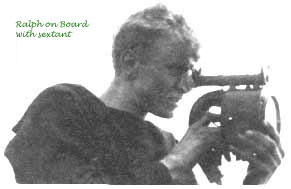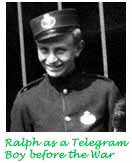

|
|||||
| Ralph Stobart Robson, signalman, life in the British Royal Navy World War Two, sinking of Prince of Wales and the Repulse, Singapore | |||||
|
|||||
|
|||||
|
The landing jetty was well south of Freetown and it was a fair walk into the town. The route went through part of the town occupied by natives. Men, women and childern swarmed the streets which were lined with rough shacks. The whole place looked run down. Gradually we moved into the town, which didn't look much better. From my schooldays I had thought Freetown was a town, but it seemed more like a glorified village. Everywhere the natives were calling to us and offering things for sale. We walked around the town and found it strange and interesting, but the humid heat was very oppresive and unlike the sea breezes of the ship. We had to return at a specific time and when the transport turned up we were soon back aboard. One of the crew had been obsessed with talk about sex. He was the only son of a country vicar from somewhere in central England. The lads had been pulling his leg and one of them, who had been Freetown before (or said he had) described to him the joys of the brothels ashore. Well, this young man, although warned of the dangers both officially and by his messmates, had lost his cherry in one of them. A few days later he confided to the leading hand that all was not well. The leading hand advised him to see the quack and it was confirmed that he had a venereal disease. He was shifted to the C.A. mess where he sank into a state of deep depression. He was later transferred ashore, so in a way he may have been lucky. The journey to Cape Town was finally completed. Just before we got there we had a spell of very bad weather and indeed it was reported that one of the destroyers had lost a crew member overboard. I doubt if many of our ships company had any idea of what the gigantic waves were like. My year in the North Atlantic trawler had taught me that. What we had run into was the tail end of a southern ocean storm which had come roaring round the horn. However, the sight of Table Mountain and Sinal Hill with the surrounding beautiful country soon made me forget the past. The ship was assisted to dock alongside the wall. Nothing was visible of Capetown as we were tied alongside large godowns used for receiving cargo. The signal deck was above these and it was a pleasure to go on watch. Some of the crew had been in Capetown and Durban before and they said that the hospitality of the British was legendary. Everyone was agog to go ashore. We were there just long enough for both watches to be given leave. I had the frustrating experience of standing on the signal deck and watching the liberty men line up to be inspected and then marched down the godowns to where, it seemed, hundreds of cars were waiting to take them off to unknown pleasures. The following day I was one of the lucky ones. It seemed from those assembled for inspection that more than half the ship's company had gone on leave the previous day. We left the ship and found that there were no cars waiting for us and so we straggled on to Adderley Street. Before leaving the ship we had been told that we could send one telegram home sending greetings and the state of our health. I made my way to the H.P.O. and found that the telegraph office was round the back. I filled in my form and handed it over the counter. After paying for it I turned round and was faced with an elderly lady. She had been sending off a parcel and asked me if I was off the big ship in the harbour. This was obviously a conversation starter as the whole world knew that the Prince of Wales was in Capetown and that she was the only warship there, the two destroyers having been sent round to Simonstown. She then asked me where I was going and I told her that I proposed to have a walk around the botanical gardens. She asked me if she could accompany me as she knew them very well. I wasn't best pleased at this, but in those days I was a very polite young man and I agreed. She and I walked out of the post office and the next few steps changed the whole aspect of my visit to Capetown. "Put these in the car, John," she said, handing the parcels to a black man standing next to the car (Rolls Royce), "and pick us up at the higher entrance". We set off to the gardens with me in a state of what I can only call pussystruck (in the politest way). She walked me round the gardens and displayed a remarkable knowledge of its plants. During this stroll she questioned me about myself and then during the subsequent car journey she began to reveal the story of a remarkable life. She had spent most of her life in German South West Africa, a place known as Namibia. Some time before the turn of the century she had been living in a German country town. A notice had appeared in the local newspaper for young ladies between certain ages to appear at the town hall to be screened for a possible onward journey to G.S.W.A. there to be introduced to the colonists for the purpose of marriage. I listened to this story with increasing amazement. The candidates, of whom there were a fair number, were questioned on their lives and ambitions and a few, including herself, were selected. They then had to go to Berlin for final appraisal. Incidentally, the interviews were conducted by representatives of both Church and State. It had been finally admitted that there was no other way of getting wives for these settlers in an arid and lonely land other than appealing for outside assistance. She was one of those finally selected. She never told me how her family, if any, reacted to this. They sailed from Hamburg to Walfis Bay. When they got there and were moving in towards the shore she saw a line of men and realised that they were the prospective husbands. |
|||||
|
|||||
